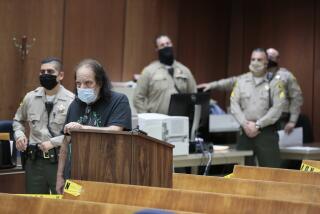Mass Killer’s Bid for Release Is Denied
- Share via
Edward Charles Allaway, the disgruntled janitor who murdered seven people a quarter-century ago at the Cal State Fullerton library, is still a danger to society and should not be freed from a psychiatric hospital, an Orange County judge ruled Friday.
The decision by Superior Court Judge Frank F. Fasel concluded Allaway’s most serious bid yet to gain his freedom. Several psychiatrists testified that Allaway would not pose a risk if released under state supervision. And in three days of testimony, Allaway pronounced himself cured of mental illness, apologized for his actions and asked to be set free.
But Fasel noted that doctors had difficulty predicting whether Allaway might kill again, given his long history of schizophrenia.
The judge’s opinion was greeted with relief by relatives of the seven victims and witnesses to the shooting rampage.
Allaway wept when a therapist told him the news, said his attorney, Deputy Public Defender John Bovee.
“It’s been a very long haul for him,” Bovee said. “He’s been doing so well in treatment, I hope this isn’t a big setback for him.”
Allaway, now 63, was found not guilty because of insanity in 1977 and is eligible to apply for release once a year.
“I just think what he did is beyond what anyone is capable of being cured of,” said Cynthia Carpenter, a former Cal State Fullerton library employee who witnessed the July 12, 1976, rampage. “Some of the things that happen these days, you just wonder, ‘How could that happen?’ So I wouldn’t have been shocked if he was let out. But I’m glad that justice prevailed.”
Deputy Dist. Atty. Daniel Wagner said he was pleased with Fasel’s decision, adding that the structured setting of a locked-down mental hospital has served Allaway well and that releasing him would be “a recipe for disaster.”
“It would be ludicrous to release him,” Wagner said.
Bovee proposed a gradual release program in which he would stay at Patton State Hospital in San Bernardino County and initially take only periodic trips into the community. Only after several years would Allaway be allowed to live free from state supervision.
Fasel referred to that plan as an “experiment” he was unwilling to conduct. The judge also criticized Allaway for refusing to meet with state mental health officials, instead basing his case on experts hired by the Orange County public defender’s office as well as reports from doctors at Patton State Hospital.
Although several doctors said they thought Allaway’s mental illness was in remission, they could not predict whether it would flare up again and result in future violence.
That concerned Fasel, the latest in a line of judges to refuse to set Allaway free.
“He still has a mental disorder that was fundamental in triggering his 1976 psychotic episode,” Fasel wrote. “He is also still a threat to the community. . . . The experts’ opinions regarding his potential for future dangerousness are unsatisfactory.”
The prospect of releasing a mass murderer--something that experts believe has never occurred in the United States--prompted some to organize opposition to Allaway’s effort. Led by Orange County Supervisor Todd Spitzer, the group set up a Web site and organized a letter-writing campaign and memorial service on the Cal State Fullerton campus.
Patricia Almazan, the daughter of one of Allaway’s victims, attended virtually every day of the monthlong hearing. The most agonizing moment, she said, came when Allaway testified that he thought his victims would support his release. “That was very aggravating for me because he was speaking for my father, whose voice he silenced,” Almazan said.
She said she’s frustrated that Allaway can apply again for release in a year. She and Spitzer are seeking a new state law that would limit those found not guilty because of insanity to hearings only every five years. They said that by some estimates, the latest hearing cost taxpayers more than $250,000.
“There’s never any closure for myself and the other victims. It’s a constant repetition of emotions that have to be spent on this case, reliving the whole thing every time there’s a hearing,” Almazan said. “Not only did he take our loved ones, but he took our freedom too. As long as he’s up for freedom, we don’t have ours.”
*
Times staff writer Mai Tran contributed to this report.
More to Read
Sign up for Essential California
The most important California stories and recommendations in your inbox every morning.
You may occasionally receive promotional content from the Los Angeles Times.














